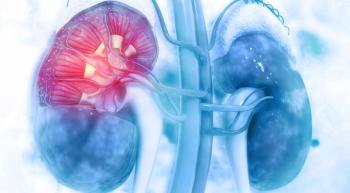
Oral SERD Elacestrant Shows Significant PFS Improvement in ER+/HER2– Advanced Breast Cancer
Elacestrant, an oral selective estrogen receptor degrader, may hold the potential to replace intramuscular fulvestrant injections for patients with endocrine receptor–positive, HER2-negative breast cancer.
Elacestrant (RAD-1901), an oral selective estrogen receptor degrader (SERD), significantly prolonged progression-free survival (PFS) in pretreated patients with endocrine receptor (ER)-positive, HER2-negative advanced breast cancer, representing an oral contender to current standard-of-care (SOC) endocrine therapy options in this patient population. Moreover, the benefit was observed in both the total population and a subset of patients with ESR1-mutated disease, according to findings published in the Journal of Clinical Oncology.
Data from the phase 3 EMERALD trial (NCT03778931) demonstrated that PFS was prolonged in all patients (HR, 0.70; 95% CI, 0.55-0.88; P = .002), as well as in patients harboring an ESR1 mutation (HR, 0.55; 95% CI, 0.39-0.77; P = .005). In addition, cardiac and ocular toxicities, which have been reported with other SERDs, were not observed on this study.
Furthermore, the elacestrant had a promising safety profile; grade 3/4 treatment-related adverse events (TRAEs) were reported in 7.2% of patients receiving elacestrant and 3.1% of those receiving the standard of care regimen. Nausea, the most prominent any grade TRAEs to be observed, occurred in 35.0% and 18.8% of patients within the 2 arms, respectively.
“Elacestrant showed a predictable and manageable safety profile consistent with other endocrine therapies,” wrote Francois-Clément Bidard, MD, PhD,, professor of medicine and medical oncology at Institut Curie in the study. “These data represent a long-awaited opportunity to potentially offer second- or third line, including heavily pretreated, patients with breast cancer a new effective option and further advance toward precision medicine in the ER-positive/HER2-negative subtype.”
Authors also acknowledged that the efficacy of elacestrant in this setting is exciting, because the agent represents an oral alternative to intramuscular fulvestrant (Faslodex) injections.
Recommended first-line SOC for locally advanced or metastatic ER-positive, HER2-negative breast cancer is endocrine therapy, either with an aromatase inhibitor (AI) or fulvestrant, and a CDK4/6 inhibitor. Sequential therapies may be necessary if a patient’s disease demonstrates endocrine resistance, which involves the development of acquired mutations in a variety of genes such as ERBB2, NF1, or ESR1.
Although guidelines advise sequential endocrine therapies, the clinical activity of endocrine monotherapy for these patients is limited, and the median PFS for patients with prior treatment with CDK4/6 or mTOR inhibitors is 2 months—underscoring a significant unmet clinical need.
Elacestrant is a novel, nonsteroidal, oral SERD which has elicited promising antitumor activity and tolerability in phase 1 trials with heavily pretreated patients. To that end, investigators designed an international, multicenter, open-label, phase 3 trial to pit the agent against SOC endocrine therapy.
Between February 2019 and October 2020, 477 patients were randomly assigned to receive either elacestrant (n = 239) or SOC therapy (n = 238). To enroll, patients needed a histologically or cytologically proven ER-positive, HER2-negative breast adenocarcinoma, and locoregionally recurrent or metastatic disease. They also needed demonstrated disease progression following 1 to 2 lines of endocrine therapy. Previous treatment with CDK4/6 inhibition, in combination with an AI or fulvestrant was required.Most enrolled patients had visceral metastasis in both arms (68.2% and 71% in the 2 arms, respectively).
Patients were stratified by ESR1 status, visceral metastases, and previous fulvestrant treatment. Patients who received elacestrant did so at a dose of 400 mg daily. In the event of toxicity, reduction to 300 mg or 200 mg daily were permitted. Investigators could choose between fulvestrant, anastrozole, letrozole, or exemestane monotherapy for SOC endocrine therapy.
PFS was the primary end point for the trial. Key secondary end points included overall survival (OS) in all populations, as well as objective response rate, duration of response, and clinical benefit rate, and safety and tolerability.
The 6-month PFS rate was 34.3% (95% CI, 27.2%-41.5%) with elacestrant and 20.4% (95% CI, 14.1%-26.7%) with the SOC. Among patients with an ESR1 mutation, the rates were 40.8% (95% CI, 30.1%-51.4%), respectively. Moreover, the 12-month PFS rates in the all-patient population was 22.3% (95% CI, 15.2%-29.4%) vs 9.4% (95% CI, 4.0%-14.8%), respectively. In the ESR1-mutated population, the 12-month PFS rate was 26.8% (95% CI, 16.2%-37.4%) vs 8.2% (95% CI, 1.3%-15.1%), respectively.
In terms of OS, at an interim analysis, 149 events had occurred in all patients, with a hazard ratio of 0.75 (95% CI, 0.54-1.04; P = .08). In the ESR1-mutated population, there were a total of 68 events (HR, 0.59; 95% CI, 0.36-0.96; P = .03).
Overall, 218 patients receiving elacestrant (92.0%) and 197 patients receiving SOC (86.0%) experienced an any-grade adverse event (AE). In both arms, the most common toxicities were nausea (35.0% vs 18.8%), fatigue (19.0% vs 18.8%), vomiting (19.0% vs 8.3%), decreased appetite (14.8% vs 9.2%), and arthralgia (14.3% vs 16.2%). For grade 3/4 AEs, the most common toxicities with elacestrant included nausea, back pain, and increased ALT; nausea, fatigue, diarrhea, and increased AST were most prevalent in the SOC arm.
AEs were responsible for treatment discontinuation in 15 patients in the experimental and 10 patients in the control. No treatment-related deaths were reported in either cohort.
Reference
Bidard FC, Kaklamani VG, Neven P, et al. Elacestrant (oral selective estrogen receptor degrader) versus standard endocrine therapy for estrogen receptor-positive, human epidermal growth factor receptor 2-negative advanced breast cancer: results from the randomized phase III EMERALD trial. J Clin Oncol. 2022;40(28):3246-3256. doi:10.1200/JCO.22.00338
Newsletter
Knowledge is power. Don’t miss the most recent breakthroughs in cancer care.

























































































